|
|
|
Sort Order |
|
|
|
Items / Page
|
|
|
|
|
|
|
| Srl | Item |
| 1 |
ID:
102291
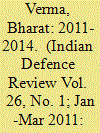

|
|
|
| 2 |
ID:
185263
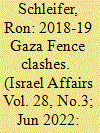

|
|
|
|
|
| Summary/Abstract |
This article examines the violent clashes between Hamas and Israel along the Gaza Fence (30 March 2018–27 December 2019) from a psychological operations (PSYOP) perspective. It shows how Hamas managed, through a skilful combination of mass riots, media manipulation, and quick adaptation to changing circumstances to subvert the strategic priorities of the Israel Defence Forces (IDF), wear down Israeli morale, and erode Israel’s sovereignty in its southern region – all this while deterring Israel from launching a large-scale military operation in Gaza. As such, the Gaza Fence clashes provide an example of a PSYOP-based strategy that can be applied to other border conflict zones, such as Morocco, Saudi Arabia, Mexico, and Islamist insurrections.
|
|
|
|
|
|
|
|
|
|
|
|
|
|
|
|
| 3 |
ID:
065037
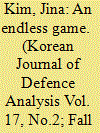

|
|
|
| 4 |
ID:
152676
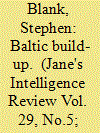

|
|
|
| 5 |
ID:
034689
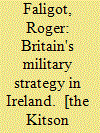

|
|
|
|
|
| Publication |
London, Zed Press, 1983.
|
| Description |
249p.Pbk
|
| Standard Number |
0862320496
|
|
|
|
|
|
|
|
|
|
|
|
Copies: C:1/I:0,R:0,Q:0
Circulation
| Accession# | Call# | Current Location | Status | Policy | Location |
| 022859 | 941.60824/FAL 022859 | Main | On Shelf | General | |
|
|
|
|
| 6 |
ID:
139319
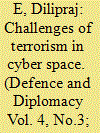

|
|
|
| 7 |
ID:
131338
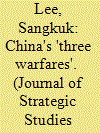

|
|
|
|
|
| Publication |
2014.
|
| Summary/Abstract |
Entering the twenty-first century, China has demonstrated an assertive foreign policy, not only in employing various types of economic and military leverage but also in conducting the Three Warfares (??) - psychological warfare, public opinion warfare, and legal warfare. This article attempts to identify the motives and methods of China's Three Warfares by analyzing its history, logic, and agents. Based on this analysis, the author also presents the position of the Three Warfares in China's foreign policy and the warfares' impact on the international security environment involving other major powers and China's neighbors.
|
|
|
|
|
|
|
|
|
|
|
|
|
|
|
|
| 8 |
ID:
126124
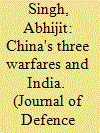

|
|
|
|
|
| Publication |
2013.
|
| Summary/Abstract |
For the past decade, China is known to have actively used 'three warfares' (3Ws) strategy-media, psychological and legal warfare-to weaken its adversaries in regions constituting what it perceives to be its 'core interests'. While a wide range of tools have been deployed, the attacks have remained mostly confined to Taiwan and South-East Asian states involved in the territorial disputes in the South China Sea. But with Beijing's influence in South Asia and the Indian Ocean Region (IOR) growing, there is evidence emerging of the 3Ws strategy being put to use against India. The evolving Chinese 3Ws strategy goes beyond mere propaganda wars and misinformation campaigns. Expanding conventional war dynamics into the political domain, the 3Ws appear aimed at undermining India's organizational foundations and target military morale. More disquietingly, the strategy appears designed to subdue India without even needing to fight.
|
|
|
|
|
|
|
|
|
|
|
|
|
|
|
|
| 9 |
ID:
122490
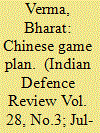

|
|
|
|
|
| Publication |
2013.
|
| Summary/Abstract |
With the opening of two fronts against New Delhi, Beijing will, in collusion with Islamabad, repeat '1962' in the near future on an enlarged scale.
As a tactical ploy for the past several years, Beijing and Islamabad have been dishing out sermons on friendship. China has used its lobby successfully in India to promote the concept that the two nations, instead of being at loggerheads with each other, should join hands to make the twenty-first century theirs.
|
|
|
|
|
|
|
|
|
|
|
|
|
|
|
|
| 10 |
ID:
174208
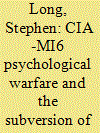

|
|
|
|
|
| Summary/Abstract |
The west’s prototype covert action of the Cold War against Albania, codenamed BGFIEND/Valuable, is often characterized as a failure of the rollback policy against the Soviet bloc. This article argues that, from late 1949, the CIA and MI6 did not attempt to overthrow Enver Hoxha’s communist regime as historians have assumed, but to subvert and harass it primarily through psychological – not paramilitary – warfare. On one hand, western intelligence enjoyed some modest propaganda achievements, and valuable organizational and tradecraft experience was acquired for future operations. Nevertheless, BGFIEND/Valuable also faced innumerable challenges and setbacks, illustrating the difficulty of waging subversive psychological warfare against a hostile authoritarian state in the early Cold War.
|
|
|
|
|
|
|
|
|
|
|
|
|
|
|
|
| 11 |
ID:
132420
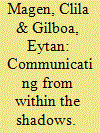

|
|
|
|
|
| Publication |
2014.
|
| Summary/Abstract |
Communicating with the media is an ongoing complicated task intelligence services tackle from the day they are established. The relationship is inherently tense because one side wishes to reveal what the other wishes to conceal, highlighting the constant contradiction between two major principles: the public's right to know versus the government's duty to protect national security. Reconciling these two principles becomes exceedingly complex during crisis situations because both the media and the public demand to know what is happening and why, whereas intelligence services can offer only limited and often incomplete information, a limitation imposed by the need to protect vital secrets. Moreover, the services frequently face a quandary: they are innately secretive and cannot advertise their accomplishments and successes, but these are commonly exposed when they fail. This distorts the natural balance other organizations are generally able to maintain between failures and achievements and any publicity about them.
|
|
|
|
|
|
|
|
|
|
|
|
|
|
|
|
| 12 |
ID:
080514
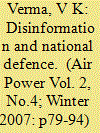

|
|
|
| 13 |
ID:
141617
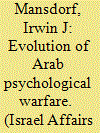

|
|
|
|
|
| Summary/Abstract |
Psychological warfare is a ‘soft power’ technique used to attain strategic objectives. In the Israeli–Palestinian dynamic, psychological warfare has evolved to where it now shares goals with ‘public diplomacy’ as a means of influencing policy and politics. Arab strategy has moved from ineffective attempts to influence the Israeli public to credible and cynical strategies that often involve a disregard for and exploitation of civilian casualties and the appearance of embracing ideology associated with revolutionary figures and human rights. ‘Non-violent resistance’ invoking Gandhi, Mandela and King as models for Palestinian Arab strategy is now common and serves to attract sympathy. Despite claiming a philosophy of nonviolence, the goal of many anti-Israel groups remains the dissolution of Israel as the state of the Jewish people.
|
|
|
|
|
|
|
|
|
|
|
|
|
|
|
|
| 14 |
ID:
068189
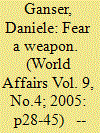

|
|
|
| 15 |
ID:
025630
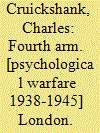

|
|
|
|
|
| Publication |
London, Davis-Poynter, 1977.
|
| Description |
200p.
|
| Standard Number |
0706702123
|
|
|
|
|
|
|
|
|
|
|
|
Copies: C:1/I:0,R:0,Q:0
Circulation
| Accession# | Call# | Current Location | Status | Policy | Location |
| 017273 | 355.3434/CRU 017273 | Main | On Shelf | General | |
|
|
|
|
| 16 |
ID:
150544
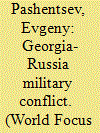

|
|
|
|
|
| Summary/Abstract |
Local armed conflicts that face the collision of interests of great powers usually lead to serious geopolitical consequences. In this case, the coverage of the events in mass media goes far beyond the countries directly involved in the conflict. The public assessment of the situation without doubt becomes a field of acute psychological warfare. The Georgia-Russia military conflict of 2008 was no exception in this respect. In spite of its short duration and the relatively small number of victims, it became the focus of international attention and was accompanied by a high level of confrontation in the information environment.
|
|
|
|
|
|
|
|
|
|
|
|
|
|
|
|
| 17 |
ID:
172191
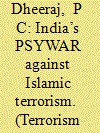

|
|
|
|
|
| Summary/Abstract |
Islamic terrorism in India has posed a formidable threat to India’s national security. A result of inimical state policies from India’s north-western borders as well as home-grown radicalisation, it has developed into a threat that demands a multi-faceted approach in order to be contained. Counterterrorism strategies to defeat the threat need reliance on psychological warfare in combination with offensive operations. This article, therefore, examines the current state of India’s strategic psychological operations against Islamic terrorism and prescribes a Trident Strategy for effective counterterrorist operations. On observation of the counterterrorist successes in Punjab, the Trident Strategy is composed of a strong political will, proactive action and propaganda machinery.
|
|
|
|
|
|
|
|
|
|
|
|
|
|
|
|
| 18 |
ID:
133513
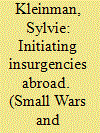

|
|
|
|
|
| Publication |
2014.
|
| Summary/Abstract |
Secret French plans to launch guerrilla-style raids on the British Isles devised in the spring of 1796 were referred to as 'chouanneries'. The name and concept behind these small-war operations were modelled on the irregular tactics used by the Chouan rebels in the Vendée, which the French state army had brutally quashed, but some wished to transfer into their institutional practice. Part of France's ongoing military strategy in the war against Britain, which included fomenting insurrection in Ireland, these irregular operations were to be manned partially by pardoned deserters and released convicts and prisoners of war. Of these, only Tate's brief invasion of Wales in 1797 was realised, but the surviving plans provide insightful historical lessons into an Anglophobic mindset shared by a small network of practitioners and policy deciders on the effectiveness of such shock and awe tactics. Largely motivated by the desire to take revenge for Britain's support of counter-revolutionaries in the Vendée, these plans could more aptly be referred to as counter-'chouanneries'.
|
|
|
|
|
|
|
|
|
|
|
|
|
|
|
|
| 19 |
ID:
106608
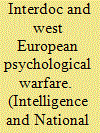

|
|
|
|
|
| Publication |
2011.
|
| Summary/Abstract |
Interdoc, or the International Documentation and Information Center, was established in The Hague in early 1963 in order to coordinate a transnational network of institutes active in the field of analysing trends in communist ideology and societies. The product of deliberations between intelligence agencies and the private sector in Western Europe during the late 1950s, Interdoc reflected a need to develop and project a European stance on Cold War issues separate from an all-dominant US influence. Yet the Americans were present from the beginning, and their involvement gradually increased over time. This article covers the details of this involvement and uses it to comment on how Interdoc represents an interesting case of inter-service cooperation in anti-communist activities in the West.
|
|
|
|
|
|
|
|
|
|
|
|
|
|
|
|
| 20 |
ID:
107820
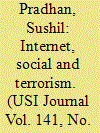

|
|
|
|
|
|
|
|